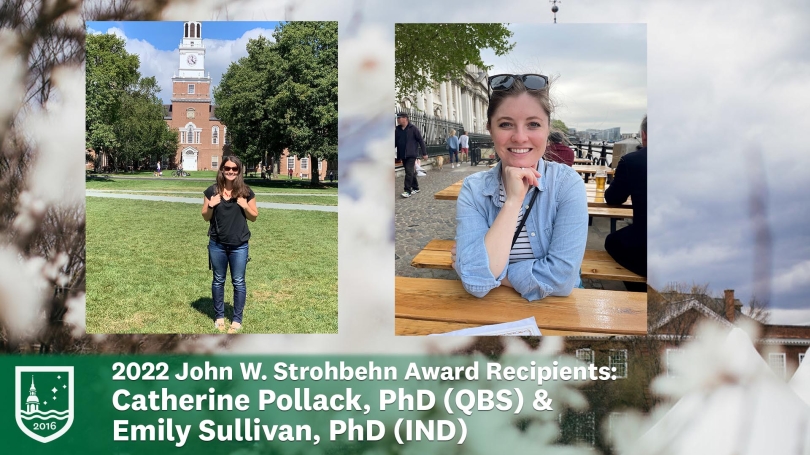
2022 Strohbehn Medal Award Recipients: Catherine Pollack, QBS and Emily Sullivan, Integrative Neuroscience
The John W. Strohbehn medal is presented annually to a graduating Ph.D. student(s) that best exemplifies the qualities of a scientific scholar. Someone who possesses personal qualities of intellectual curiosity, dedication, and commitment to the pursuit of new scientific knowledge and to teaching, as well as a sense of social responsibility to the research community.
Professor Duane Compton, dean of the Geisel School of Medicine, presented the award at the Guarini Investiture Ceremony. Noting "the exceptional quality of the graduates this year," he announced two students would be recognized with the award this year: Dr. Catherine Pollack from the program in Quantitative Biomedical Sciences, and Dr. Emily Sullivan from the program in Integrative Neuroscience.
Catherine Pollack joined the Quantitative Biomedical Sciences program in 2018 from the University of Virginia's School of Science and Engineering with a B.S. with High Distinction in Biomedical Engineering. Her thesis co-advisors, Dr. Diane Gilbert-Diamond and Dr. Tracy Onega wrote in their letter of recommendation that "Catherine is someone who will not only perform exceptionally well in a defined set of expectations – but will extend the impact of her role through creative, collaborative, and dynamic ways."
Ample evidence of this is found in both her scientific and community contributions. During her time at Dartmouth, Catherine's research contributions have resulted in 11 peer-reviewed publications, 2 pre-prints, and 2 papers currently under review, and 15 conference abstracts. She also served as a data analyst on the COVID Tracking Project at The Atlantic, where her work resulted in eight co-authored news articles, three of which were featured in The Atlantic.
Catherine's research interests focus on the evaluation of public health communication on social media platforms. She leverages her interdisciplinary background – which spans biomedical engineering, statistics, science policy, epidemiology, data science, technical consulting, and public health – to make both methodological and applied contributions.
She successfully defended her dissertation, "Characterizing the Availability and Accuracy of Obesity-Related Health Information: Novel Data Science Methods to Combat Online Health Misinformation," and will go on to a senior professional position in the Decisions Systems Group, Asymmetric Operations Sector at Johns Hopkins University Applied Physics Laboratory.
Many congratulations, Catherine!
Emily Sullivan joined the Program in Experimental and Molecular Medicine in 2016 with Bachelor of Science magna cum laude with honors in behavior neuroscience and biology from Randolph-Macon College.
During her first two years in the lab of Dr. Allan Green, she worked to generate data that characterized behavioral and sex difference characteristics related to alcohol use disorder in schizophrenia. The impressive volume of data resulted in two published manuscripts, and Emily also served as contributing author on a book chapter focusing on the mechanisms of clozapine.
Emily's work has been recognized nationally with a F31 Fellowship award. Although not a requirement of graduate students in the IND program, Emily was motivated to submit a proposal, evidence of her academic ambition which will hold her in good stead.
In addition to her academic contributions to the field, Emily has also dedicated herself to developing strong mentoring skills through her time at Dartmouth. She has served as one of the primary organizers of the Upper Valley Brain Bee (Dartmouth College's chapter of an international neuroscience outreach program founded by the Society for Neuroscience). She has been invited to local middle schools to present her work and has presented lectures to medical students and addiction fellows on the pharmacology and neurobiology of addiction.
Her thesis advisor, Dr. Wilder Doucette, says of her dedication to teaching that "Emily clearly enjoys being a mentor and teacher and I have no doubt that she will be an outstanding mentor to her future mentees."
Indeed, Emily will go on from Dartmouth to take a position into a T32 training slot at the Bowles Center for Alcohol Studies at the University of North Carolina (UNC) School of Medicine. She will join the lab of Dr. Donita Robinson and be part of a large collaborative research group.
Many congratulations to Emily!